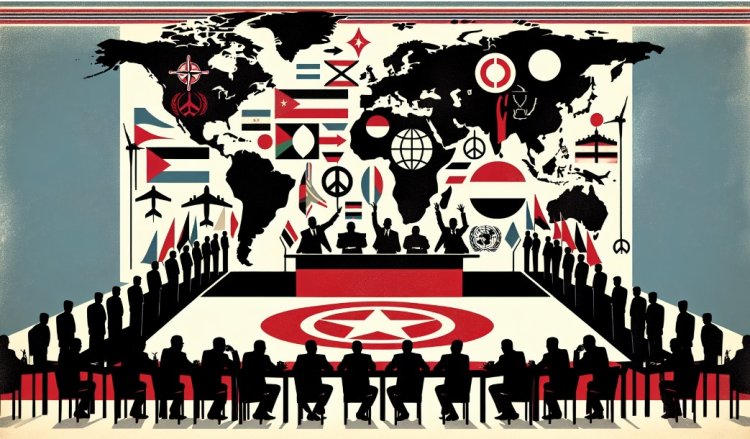Tensions in the Middle East: A Closer Look
Explore the complexities of current tensions in the Middle East. This detailed analysis provides insights into the geopolitical, social, and economic factors driving regional conflicts.

Introduction
Tensions in the Middle East have escalated due to a series of violent clashes and attacks between Iran, Israel, and other regional actors. These conflicts have had far-reaching implications, leading to heightened concerns among world powers and the international community. The ongoing hostilities have not only raised the risk of a regional war but have also affected global security, prompting countries to issue warnings against travel to certain areas. Against this backdrop, it is essential to gain a deeper understanding of the complex dynamics at play and the potential ramifications of these events.
In this article, we will examine the recent developments in the Middle East, shedding light on the sequence of events, the involvement of different countries and factions, and the broader impact of the escalating tensions. By delving into the details of these conflicts, we aim to provide insights into the geopolitical landscape of the region and the implications of these developments for both regional and global stability.
Background of the Conflict
The tensions in the Middle East have a long and complex history, with conflicts rooted in political, religious, and territorial disputes. The primary actors in this ongoing turmoil are Iran, Israel, and its allies, as well as other regional factions. The conflict has escalated due to a series of violent clashes and attacks, leading to heightened concerns among world powers and the international community. To understand the current situation, it’s essential to delve into the background and the sequence of events that have led to the present crisis.
The conflict can be traced back to longstanding hostilities between Iran and Israel, with disputes over territorial control and influence in the region. The involvement of other factions, such as Hamas, Hezbollah, and various militant groups, has further complicated the situation. These conflicts have had far-reaching implications, leading to global security concerns and prompting countries to issue travel warnings to certain areas. The complex dynamics at play have raised the risk of a regional war and have significant implications for both regional and global stability.
The recent developments in the Middle East have seen a series of retaliatory attacks and military operations, with the involvement of different countries and factions. The impact of these events has extended beyond the Middle East, prompting the United States to express strong concerns about the potential for a regional war. The repositioning of warships in the Middle East and the coordination between the US and Israeli defence forces indicate the gravity of the situation.
The conflicts in the Middle East have also drawn the attention and involvement of other world powers, such as France, Britain, Germany, and others, who have issued warnings against travelling to the region due to the increased threat level. The escalation of tensions has resulted in heightened security measures and military actions, with the potential for further retaliation and military offensives. The impact of these conflicts on global security and stability cannot be overstated, warranting a closer examination of the geopolitical landscape of the region and the implications of these developments.
Iranian attack on Israel
The recent weeks have seen a significant rise in tensions in the Middle East, particularly involving Iran and Israel. The conflict intensified due to a series of violent clashes, including an Iranian attack on Israeli territory. The attack was believed to be in retaliation for a strike on the Iranian embassy building in Damascus, which resulted in the deaths of several Iranian officials. This incident further escalated the ongoing hostilities between the two nations and raised concerns among world powers about the potential for a full-scale regional war.
The United States has expressed strong concerns about the situation, leading to the repositioning of warships in the Middle East. US officials have coordinated with the Israeli defence forces to prepare for potential Iranian attacks on Israeli territory. The heightened alert level and security measures have prompted several Western countries to issue warnings against travel to Israel, citing an increased threat level in the region.
Amidst the heightened tensions, Israel's military operations have seen significant success. The Israeli Navy intercepted an aerial object approaching the country through the Red Sea, neutralising the potential threat using advanced air defence systems. The incident reflected the ongoing security challenges faced by Israel due to the threats posed by Iran and other regional actors.
Iran's attacks on Israel have been characterised as complex, involving coordination with allies in Yemen, Lebanon, and Iraq. These multi-faceted attacks have raised concerns about the potential for a broader conflict in the region, drawing the attention of world powers and prompting responses from various countries. The implications of these developments on regional stability and global security have underlined the need for a closer examination of the geopolitical landscape in the Middle East and the complex dynamics at play.
US Concerns and Response
The United States has expressed strong concerns about the potential for a regional war in the Middle East, particularly in response to the Iranian attack on Israel. As a result of these concerns, the US has taken several measures to address the escalating tensions and prepare for potential military offensives.
The US has repositioned many of its warships in the Middle East to anticipate an Iranian attack on Israeli territory. General Michael Eric Killa, the US Centcom Commander, visited Israel to coordinate defence moves with the Israeli Joint Chiefs of Staff, highlighting the gravity of the situation and the need for collaborative efforts to address the growing threat.
In addition to military preparations, the US has issued warnings against travel to Israel, urging its embassy staff not to travel outside Central Israel. This reflects the heightened threat level in the region and the need for enhanced security measures to protect against potential attacks.
The US has also raised concerns about Israel's decision not to inform them about the attack on Damascus, emphasising the need for improved communication and information sharing to safeguard US forces in the region and coordinate responses to potential threats.
Furthermore, the US has emphasised its support for Israel in the face of Iranian attacks while also cautioning against a major ground offensive in Rafa. This delicate balance underscores the complexity of the situation and the need for strategic decision-making to navigate the evolving dynamics in the Middle East.
Impact on Western Countries
The recent developments in the Middle East have not only drawn the attention and involvement of regional powers but have also had a significant impact on Western countries, particularly the United States and its allies. The escalating tensions have prompted strong concerns among Western nations, leading to a series of measures and responses to address the growing threat level and potential implications of the conflicts. Here is a closer look at the impact of these developments on Western countries:
-
Repositioning of Warships and Military Preparedness
The United States has repositioned many of its warships in the Middle East in anticipation of a potential Iranian attack on Israeli territory. This proactive measure underscores the gravity of the situation and the need for heightened military preparedness to address the escalating tensions.
-
Warnings Against Travel
Several Western countries, including France, Britain, and Germany, have issued warnings against travelling to Israel due to the increased threat level. These travel advisories reflect the heightened security concerns and the potential risks associated with the conflicts in the region.
-
Coordination and Information Sharing
The US has emphasised the need for improved communication and information sharing with Israel to safeguard US forces in the region and coordinate responses to potential threats. This collaborative approach highlights the strategic importance of coordination among Western allies in addressing the complex dynamics at play.
-
Impact on Military Operations and Strategic Decision-Making
The evolving conflicts in the Middle East have underscored the need for strategic decision-making and the potential implications for military operations. Western countries, particularly the United States, have expressed strong support for Israel while also cautioning against major ground offensives, reflecting the delicate balance in navigating the complexities of the situation.
The implications of the conflicts in the Middle East on Western countries extend beyond immediate security concerns, raising broader geopolitical and strategic considerations that warrant a closer examination of the evolving landscape and the potential ramifications for global stability.
The Israeli Navy's Intercept Success
Amidst the ongoing tensions in the Middle East, the Israeli Navy achieved a significant intercept success, highlighting the ongoing security challenges faced by Israel due to the threats posed by Iran and other regional actors. The successful interception operation took place when the Israeli Navy neutralised an aerial object approaching the country through the Red Sea, utilising advanced air defence systems. This incident underscores the critical role of the Israeli Navy in safeguarding the nation against potential threats and maintaining security in the region.
The interception operation, carried out using the latest sea-dome sea-based air defence system, reflects the continuous vigilance and preparedness of the Israeli Defence Forces (IDF) to address security concerns and mitigate potential risks. The IDF's constant surveillance and swift response to neutralising the potential threat demonstrate its commitment to ensuring the safety and security of the nation and its citizens.
The implications of this successful intercept go beyond immediate security considerations, shedding light on Israel's comprehensive defence capabilities and its ongoing efforts to counter the threats posed by Iran and its allies. The interception operation serves as a testament to Israel's commitment to protecting its borders and maintaining regional stability in the face of complex geopolitical dynamics and security challenges.
Iran's Multi-Front Attack
The recent tensions in the Middle East have been exacerbated by Iran's multi-front attack, targeting Israel and its allies in Yemen, Lebanon, and Iraq. This complex and coordinated assault has raised concerns about the potential for a broader conflict in the region, drawing the attention of world powers and prompting responses from various countries. The implications of these developments on regional stability and global security have underlined the need for a closer examination of the geopolitical landscape in the Middle East and the complex dynamics at play.
Iran's attack on Israel was in retaliation for what is widely believed to be an Israeli strike on the Iranian embassy building in Damascus, resulting in the deaths of several Iranian officials. The subsequent Iranian threats and attacks on Israeli territory, coupled with the involvement of allies in Yemen, Lebanon, and Iraq, have heightened concerns about the potential for a regional war, prompting responses from world powers such as the United States, France, Britain, and Germany.
The multi-faceted nature of Iran's attacks, including missile and drone strikes, as well as coordinated actions by its allies, has further complicated the security landscape in the Middle East. The ongoing hostilities have led to heightened security measures and military actions, with the potential for further retaliation and military offensives. The impact of these conflicts on global security and stability cannot be overstated, warranting a closer examination of the complex dynamics at play and their implications for both regional and global stability.
Potential Consequences for Gaza
The escalating tensions in the Middle East, particularly the Iranian attack on Israel, have raised significant concerns about the potential consequences for Gaza. As the conflict between Israel and the Iranian-funded and armed group Hamas continues, there are several potential ramifications for Gaza and its inhabitants. Here's a closer look at the implications of the ongoing hostilities for the Gaza Strip:
-
Humanitarian Crisis
The conflict has led to a growing humanitarian crisis in Gaza, where more than a million Palestinians have fled amid the escalating tensions. The potential for a major counter-offensive against Iran by Israel could exacerbate the already dire living conditions in Gaza, further straining access to essential resources and services for the population.
-
Impact of regional conflict
A direct confrontation with Iran or a multi-front war could shift the focus of the Israeli leadership away from the conflict in Gaza, potentially impacting the scale and intensity of military operations in the region. The war in Gaza may be influenced by Israel's response to the Iranian attack, leading to a reassessment of military strategies and priorities.
-
Potential Ceasefires and Broader Diplomatic Efforts
The evolving dynamics of the conflict in the Middle East, including responses from world powers and regional stakeholders, could affect the prospects for a broader ceasefire involving multiple parties, including Israel, Iran, and Iranian-backed militant groups such as Hamas and Hezbollah. The outcome of diplomatic efforts and international negotiations may have far-reaching implications for the resolution of the war in Gaza.
-
International support and global perception
The success of a coalition, including the United States, Britain, and Jordan, in responding to the Iranian attack could influence international perceptions and support for Israel's military actions in Gaza. The impact of the conflict on Israel's standing in the international community and its diplomatic relations may shape the approach to addressing the war in Gaza and its implications for regional stability.
The potential consequences for Gaza and the broader impact of the conflict in the Middle East underscore the need for a comprehensive assessment of the evolving situation and its implications for humanitarian, diplomatic, and strategic considerations in the region.
Israeli Response and Military Plans
In response to the escalating tensions in the Middle East, particularly the Iranian attack on Israeli territory, Israel has taken several measures to address the growing threat level and prepare for potential military offensives. Here's a closer look at the Israeli response and military plans:
-
Coordination with the United States
Israeli defence forces have coordinated with the United States to prepare for potential Iranian attacks on Israeli territory. General Michael Eric Killa, the US Centcom Commander, visited Israel to collaborate on defence moves, highlighting the gravity of the situation and the need for collaborative efforts to address the growing threat.
-
Advanced Air Defence Systems
Amidst heightened tensions, Israel's military operations have seen significant success. The Israeli Navy intercepted an aerial object approaching the country through the Red Sea, neutralising the potential threat using advanced air defence systems. This successful interception operation reflects Israel's ongoing security challenges and its commitment to safeguarding the nation against potential threats.
-
Potential Ground Offensive in Rafa
Prime Minister Benyamin Netanyahu has vowed to send ground forces into Rafa, despite international pressure to halt the operation. Although Israel has promised to respond to an Iranian attack, military experts have indicated that there is no direct link between the Iranian attack and the war in Gaza, suggesting that Israel's military campaign in the Gaza Strip would not be affected.
-
Strategic Decision-Making
Israeli military analysts are divided over whether a more direct confrontation with Iran will change the war in Gaza. Some argue that a major counter-offensive against Iran could shift the focus of the Israeli leadership away from the conflict in Gaza, potentially impacting the scale and intensity of military operations in the region. This strategic decision-making underscores the complexity of the situation and the need for careful navigation of the evolving dynamics in the Middle East.
The Israeli response and military plans reflect the nation's commitment to addressing the growing threat level and potential military offensives while also navigating the complexities of the situation in the Middle East.
International Implications
The escalating tensions in the Middle East have significant international implications, with far-reaching effects on global security and stability. The recent developments involving Iran, Israel, and other regional actors have drawn the attention and involvement of world powers, prompting responses and measures to address the growing threat level and potential consequences of the conflicts.
The potential for a regional war in the Middle East has raised strong concerns among Western countries, particularly the United States and its allies. The repositioning of warships in the Middle East and the coordination between the US and Israeli defence forces reflect the gravity of the situation and the need for collaborative efforts to address the escalating tensions. The heightened threat level has prompted countries such as France, Britain, and Germany to issue warnings against travelling to Israel, reflecting the broad impact of the conflicts on global security.
The multi-faceted nature of Iran's attacks, including missile and drone strikes, as well as coordinated actions by its allies in Yemen, Lebanon, and Iraq, has further complicated the security landscape in the Middle East. The ongoing hostilities have led to heightened security measures and military actions, with the potential for further retaliation and military offensives. These developments underscore the need for a comprehensive assessment of the evolving situation and its implications for humanitarian, diplomatic, and strategic considerations in the region and beyond.



 admin
admin 










